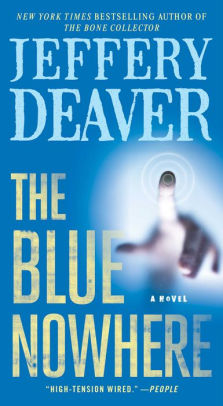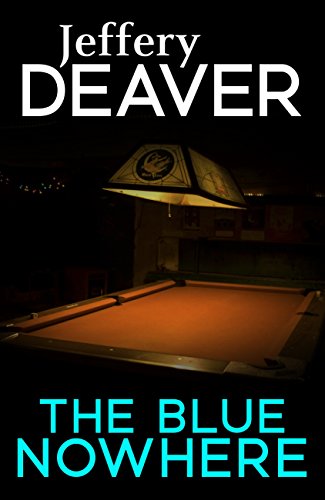The Blue Nowhere Interview
Question: Where did the idea for The Blue Nowhere come from?
Jeff Deaver: Although it appears topical — it deals with the subjects of computers and hacking, which are about as current as one can get — in fact, the story arose out of this simple premise: how frightening it would be if someone could learn details of our lives we thought were secret and then use that information to destroy us.
It then occurred to me: what better way to do this than by having the bad guy be a hacker who isn’t interested in cracking into government or corporate computers but into our personal computers at home, learning what he can about us and then “social engineering” (which means scamming or tricking) us to our doom. I loved the idea that, after reading the book, people going on-line will get a little shiver of fear that somebody might be watching what they’re reading or looking at or putting into their on-line investment account.
I also decided to create an unlikely, but appealing, pair of heroes: another young hacker — essentially good but imprisoned for hacking into the wrong place at the wrong time — and a tough street cop, who doesn’t know computers at all and is at sea in cyberspace.
The entire book is a cat and mouse chase, taking place over about two days, in which the good guys and the villain each outsmart the other — or try to — as if they were playing a real-life computer strategy game.
Q: How did you research The Blue Nowhere? Were you in contact with actual hackers?
JD: As in all of my books, I think it’s vital that research enhances the story, not detracts from it. I intended the The Blue Nowhere to be, first of all, a harrowing cat-and-mouse chase, which happens to take place in Silicon Valley and which features computers as weapons. So, while I did talk to a few hackers and computer security experts, most of my research was done on the Net itself and through books and magazines.
Q: Did you coin the term “the blue nowhere” or is it existent hacker jargon?
JD: I created the term “the blue nowhere” myself, largely because I wanted a concept that was broader than “cyberspace.” The blue nowhere means the entire world of computers and our relationship with them — from the Internet to how our lives have changed because of these miraculous machines. Also, as is revealed in the book, the phrase “the blue nowhere” has a second, significant, meaning to a central character in the story.
Q: Have you done anything to improve the security on your personal computer? Is there anything the public can do to make themselves hacker-safe?
JD: I’ve had some top security experts go over my server setup to make it as hacker-proof as possible and I have typical fire walls and encryption programs for transmitting credit card and financial data over the Net. But it’s almost impossible to completely protect yourself from hackers, short of burning your modem and cutting the cable connecting you to the outside world. As in most protective situations (your car or house, for instance) the trick is to make it so difficult to get into your system the hacker goes on to somebody else. As my hero in the book, Wyatt Gillette, says, it’s easy to make your system foolproof. The problem is that in the computer world it’s not fools you have to protect yourself against.
Q: What do you think drives a person to become a hacker?
JD: Curiosity and intellectual rebellion, I think, are the key elements. Hacking is constantly challenging — you can go as far as you want in stimulating your mind. I also feel that hackers are our new explorers. We’ve conquered the world geographically but there are still intellectual and artistic and political horizons yet to discover — ever-changing horizons, indeed — on the Internet and in the blue nowhere. There are also personal and social motives for hacking. Latchkey kids, children of abusive or neglectful parents, loners, outcasts at school, under appreciated children, are prone to hacking. Every child has a need for attention, love, affirmation . . . . and if those aren’t provided at home, well, those kids’ll go elsewhere. They can find support and acknowledgment online.
Q: If you had to pick a hacker name, what would it be?
JD: InPhamous Riter
Q: If you had the ability to hack into one system and not get caught, what would you target and why?
JD: My law school’s database to change my contracts course final grade. I got a C and I’m still mad about it.

